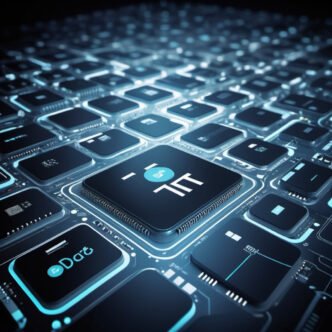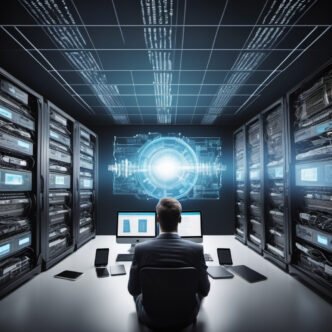Information technology is the center of global innovation and progress in today’s fast-paced world. IT technology, from cloud computing to artificial intelligence, is reshaping industries, transforming economies, and changing the way we live and work. It is a one-of-a-kind general study of the fundamental aspects of IT technology, its current trends, and the future trajectory of this dynamic domain.
The basis of IT technology
The foundation of IT technology is the storage, retrieval, and processing of information using computers, networking, and data management systems. It is the foundation of critical systems and services in healthcare, finance, education, entertainment, and many other industries. The core technologies of IT are:
Hardware: Physical devices, including servers, computers, routers, and storage systems, are the foundation of IT infrastructure. Over the years, hardware advancements have made it smaller, faster, and more energy efficient.
Software: Working frameworks, applications, and venture arrangements empower devices to perform specified tasks. Improvement in programming is the foundation of IT development.
Networking: Innovations like the web, Wi-Fi, and 5G allow gadgets to transmit and share data over vast distances.
Data Management: Databases and data warehouses store vast amounts of information, while analytics tools help extract actionable insights.
Key trends in IT technology
The IT landscape is constantly evolving, with emerging paradigms shaping its future. The absolute biggest developments include:
- Cloud computing
Cloud computing has changed the game for organizations in terms of data management and storage. With remote servers over the Internet, businesses can scale their operations while reducing costs and increasing flexibility. Major players like Amazon Web Services (AWS), Microsoft Azure, and Google Cloud dominate the space, providing solutions for businesses of all sizes.
- Artificial Intelligence and Machine Learning
AI and ML are among the most advanced technologies in the world. They allow a machine to learn from data, predict situations, and perform complex tasks automatically. Applications range from Siri and Alexa as virtual assistants to running complex algorithms in autonomous vehicles and predictive analytics.
- Cybersecurity
Now with digital transformation accelerating, cybersecurity has naturally become a must. Digital transformation is accompanied by the integrity of operations as sensitive data is protected from potential cyber threats through zero-trust security models, advanced encryption methods, and AI-powered detection systems.
- Internet of Things (IoT)
The Internet of Things enables the connection of everyday objects to the Internet for data transmission. This is starting with smart devices in homes with thermostats and lights and extending to factory industrial sensors thus creating a smarter and more connected world.
- Blockchain technology
Initially intended for digital currencies such as Bitcoin, blockchain innovation has found applications in production networks for executives, medical care, and money. Its decentralized and permanent nature guarantees simplicity and security.
- Edge Computing
With the rise of IoT and constant information handling requirements, edge processing is getting some decent forward movement. By handling information close to its source, edge inference reduces inertia and upgrades processes, making it ideal for applications such as autonomous vehicles and smart urban communities.
- Quantum computing
Although still in its infancy, quantum processing promises to take care of problems that cannot currently be solved by old-style PCs. With so much computational power, it could potentially revolutionize fields like cryptography, materials science, and drug discovery.
The role of IT in industry transformation
IT innovation is not just one area. This is the main driving force behind basically every industry change:
- Health care: Telemedicine, electronic wellness records, and human-made intelligence-controlled diagnostics are working on patient outcomes and making medical care more open.
- Finance: Fintech developments, including versatile banking, blockchain, and robo-councils, are reshaping financial administration and empowering more significant financial institutions.
- Education: E-learning stages, virtual study halls, and computerized assets are democratizing instruction and opening it up to a worldwide crowd.
- Entertainment: Real-time features, gaming stages, and augmented reality are disrupting the way we consume and create content.
- Manufacturing: Industry 4.0, represented by mechanization, IoT, and artificial intelligence, is increasing efficiency and efficiency on the industrial facility floor.
Challenges in IT Technology
Despite its significant potential, IT innovation faces several challenges:
- Data Privacy: As more information is collected and analyzed, concerns about security and ownership of information are increasing.
- Cyber Threats: Cyber attacks, information breaches, and ransomware are major threats to organizations and people.
- Skill Gaps: The rapid pace of innovation change often overwhelms access to talented experts.
- Regulatory Compliance: Navigating complex and evolving guidelines in different districts can be overwhelming.
- Ethical Concerns: Issues related to the phenomenon of human-made intelligence and the ethical use of innovation are becoming increasingly prominent.
The future of IT technology
The destiny of IT innovation is energetic and extraordinary. Emerging developments and imaginative applications promise to reshape our reality in significant ways. Here are some predictions:
- Increasing automation: From self-driving vehicles to fully computerized manufacturing plants, robotization will continue to reduce human intervention in redundant tasks.
- Personal experiences: Artificial intelligence and big data testing will empower hyper-customized experiences in areas such as medical services, retailing,g, and diversion.
- Sustainability measures: Green IT practices, energy-efficient server farms, and assembling sustainable equipment will alleviate environmental concerns.
- Global Contact: Drives such as satellite-based web and 6G innovation will bring high-speed networks to remote and underserved areas.
- Human-Machine Collaboration: The combination of advanced mechanical technology and artificial intelligence in the working environment will redefine the jobs of people and machines.
The result
IT innovation is the foundation of the current culture, driving growth and shaping what’s to come. As it continues to evolve, it offers unprecedented open doors for growth and change. However, to realize its full potential, issues related to security, ethics, and inclusion need to be addressed. By fostering collaborative efforts, investing resources in schooling, and embracing growth, we can ensure that IT innovation is a force for good to empower a brighter and more connected future for all. Will remain.













